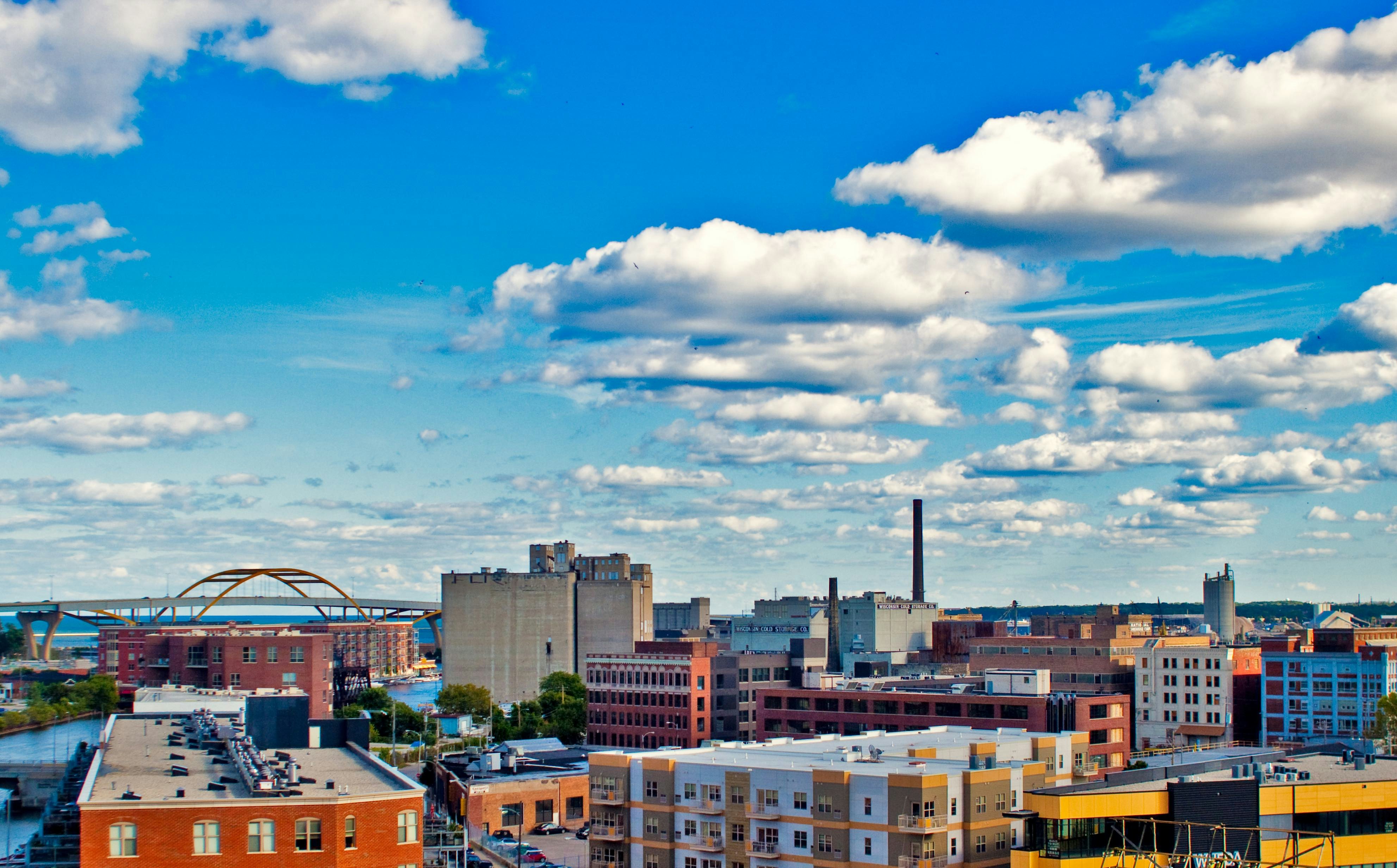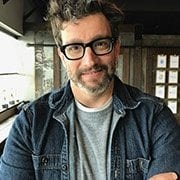
Let's get lit: The campaign to light Milwaukee's Hoan Bridge is off and running
At night, the most iconic part of Milwaukee’s skyline rests in the background in the dark. You can see its shape, lifeless, and sometimes the moon...
Just like Milwaukee.
The calendar says spring, but the weather outside says “not right now.”
Sitting across the table from Michael Hostad at Anodyne Coffee on Bruce Street our conversation shifts to the topic of gardening. Looking outside, it seems not much could grow out there in the gray chill.
But the outdoors has little to do with the type of gardening we’re going to talk about.
Hostad was first introduced to gardening as a child by his grandmother, a young impressionable kid, curious and eager to learn about vegetables and the power of dirt.
That interest waned, and it wasn’t until his adult life that his curiosity around gardening was piqued once again. He and his wife were undertaking a new landscaping project, and around the back patio was a little garden. He initially looked at the dirt, then back at his wife, and said, “That’s all you.” She decided to plant a little salsa garden, with tomatoes, peppers, and cilantro.
Then one summer night he was on that picturesque patio, sipping a glass of wine. A spark of curiosity flew. “I'd be looking at these plants, just staring at them,” he told me. “I wondered why a leaf was turning yellow, or what was going on. And the next thing I knew, I was looking online, reading about these plants, understanding how soil works, and how plants are fed and the nutrients. Suddenly, I had a Pinterest account and a board full of all this guidance stuff.”
“I'm a curious person and a nerd at heart.”
His passion for gardening was back. And late last year when Fork Farms in Green Bay came calling, he jumped at the chance to take part in what is now a gardening revolution.
This type of gardening, called hydroponics, is something Fork Farms sees as the future of gardening and a new way to bolster our food supply. Hydroponics has little to do with dirt and weather. And it has everything to do with changing the way we look at gardening.
In other words, it turns out the “garden” in gardening is optional. Fork Farms calls it a Flex Farm.
Hostad explains: “The Flex Farm is about the size of a standard refrigerator—a growing apparatus that can put out 25 to 30 pounds of fresh leafy greens every month. I've got one in my basement.”
He shows me a photo, and sure enough, it looks like a refrigerator with a light pole in the middle. There are holes on either side and bursting out of those holes are fresh greens. A Flex Farm can grow an immense amount of food in a short time.
“The plants grow every 28 days; you get a harvest of whatever you want. You can grow any seed in there that you want. Basically, anything but a root vegetable.”
A Flex Farm can effectively and efficiently grow tomatoes, cucumbers, jalapenos, leafy greens, mustard greens, collard greens, kale, and basil. It can also grow any kind of culinary herb, like rosemary or oregano.
In Hostad’s role as Executive Director of the Fork Farms Foundation, he is tasked with raising money to build awareness around this amazing technology. It really plays into his passion. And above and beyond the Flex Farm’s potential to change the very nature of gardening, it also provides an incredible opportunity to educate, inform, and reduce food insecurity.
“We do our best work in schools,” he says. “We have a whole STEM curriculum around [the Flex Farm]. When a school purchases a Flex Farm and puts it into the classroom, teachers are incorporating it into the curriculum. Everything from how a seed germinates to why it's important to eat nutritious food, to how your body processes vitamins and nutrients. We have activities, we have lesson plans, we have a full curriculum that teachers have access to.”
The initial results are astounding. “We've got kids that are excited. We’ve done some independent studies—kids that interact with the Flex Farm have a 46% more positive perception of healthy food and are 33% more likely to consume that food.”
One of their proudest, goosebump-inducing moments came when one sixth-grader, after having been exposed to the Flex Farm and what it can do said candidly, “This thing is going to change the world.”
Hostad is a tireless fundraiser, and once he gets behind something, losing is not an option. Heck, he’s one of the guys responsible for the Light the Hoan project. Whenever the bridge lights up, there is a good chance the illumination came directly from his laptop.
At night, the most iconic part of Milwaukee’s skyline rests in the background in the dark. You can see its shape, lifeless, and sometimes the moon...
Light a bridge. Change the nature of farming. No big deal. But there’s much more work to be done:
“Our goal is to get Flex Farms in schools, food pantries, and churches that couldn't otherwise afford them. We reduce those barriers. Right now, we're in the process of raising a million dollars to put 200 of these units in schools across the country. And then we also are raising funds for capacity building grants. So, for organizations that are doing great work around fighting food insecurity, we want to be able to give them dollars to support their efforts, and to grow their impact and grow their reach.”
Growth, in many ways, has been a throughline in Hostad’s entire career, and not just of the gardening variety.
Through Hostad’s high school and college years, the world was experiencing unprecedented growth in technology—the internet was a new thing and someone with programming knowledge and a decent business sense could make hay.
Hostad started his own website development business in high school and his client base was growing. He had the benefit of having an older brother who jumped from high school to a four-year college, then to a two-year technical college. Following suit, Hostad decided to attend Waukesha County Technical College (WCTC) and get his associate degree in business. “Those [technical] schools are just more equipped to get you into the industry faster, get you the skills that you need,” he says.
“I attribute everything of how I got my start to my time at WCTC. I had my own business through high school and was doing websites for businesses across the country.”
After WCTC he took a job at Strong Funds (which is now Wells Fargo) and it wasn’t a good fit. He decided to go back to school, transferring the WCTC credits over to Cardinal Stritch University and ended up getting his Bachelor’s in Business Management.
From Cardinal Stritch, he landed a job at UW-Milwaukee and caught the eye of newly appointed Chancellor Mike Lovell. Because of Hostad’s business acumen and entrepreneurial spirit, Lovell saw him as someone who can help students learn about tech and startups.
“[Mike Lovell] knew of my entrepreneurial background, running a business in high school, and he asked me to be his designee for entrepreneurship and innovation. This would have been about 2008-2009, after the crash, and people were feeling like the thing that was going to save America's soul was finding the next Mark Zuckerberg. Startups were going to fix everything.”
Hostad, along with a partner, ran a student startup challenge and a mobile app innovation lab called the App Brewery at UWM. But Lovell got hired to be the President of Marquette and about two days later Hostad got a call from Julia Taylor of the Greater Milwaukee Committee. She wanted Hostad to work in innovation for the GMC.
Hostad remembers the moment he was sitting in Lovell’s office, looking for guidance. “He mapped out my path forward at UWM, and all of them ended up in the same spot,” Hostad remembers. “Which was not going anywhere.” Lovell told him he could keep doing what he was doing and make decent money and be happy doing that. But that wasn’t the future for Hostad.
“I thought, either I go now, or I become a lifer.”
That revelation was a lot like his career being planted into a Flex Farm, harvesting his future.
He walked away from UWM and took the job at the GMC. For just over seven years he worked as the Executive Director of Innovation in Milwaukee, finding ways to assist the business community in retaining talent and improving their processes. “Dealing with Milwaukee's social challenges from a programmatic perspective,” says Hostad. “We did a lot around developing and retaining talent, attracting talent into the area from as young as middle school all the way through to early to midcareer, helping people answer the question—what's next for me?”
Again, it’s all about growth.
Of all his accomplishments, he still counts his work with partner Ian Abston to light the Hoan Bridge as one of his most important. (Saving the world’s food supply with hydroponics notwithstanding.)
This is a story that, at it’s essence, is all about making friends. It seems simple enough, meeting people, getting to know them, finding common ground, having a few drinks, and exchanging contact information. But the way Ian Abston tells it, if you’re a newbie here in Milwaukee, it is something that’s very difficult to do – and he set out to change that.
While a Flex Fam simplifies the idea of growth, Hostad knows growth is not always easy. And one exchange he had with former Baseball Commissioner and Milwaukee Brewers owner Bud Selig reminded him of that—along with the size of many of his accomplishments.
During a Zoom call about his and Ian’s other project, Forward 48 (which provides leadership development to Milwaukee’s emerging leaders), Hostad and Mr. Selig were alone on the Zoom, waiting for others to join.
“We ended up having this really great conversation,” Hostad remembers. “I give Bud credit. He was like, you did that bridge thing, right? You did the Hoan?” Hostad responded yes, noting that he and Ian were the team behind the effort. They got to talking about it and Hostad asked Bud:
“You've brought about change in multiple cities across the country. Is it as hard to do things in other cities as it is in Milwaukee?” Hostad remembers Bud laughing, saying, “You know, my dad used to tell me—if you can do it in Milwaukee, you can do it anywhere.”
Remember that refrigerator-like revolutionary device growing lettuce in Hostad’s basement?
Anywhere, indeed.
More Articles by Nicholas Pipitone
Dec. 14, 2022
•8 min read
Sep. 9, 2022
•8 min read
Apr. 15, 2022
•4 min read
About the author
Co-founder, Editor-in-Chief, Commonstate.com



